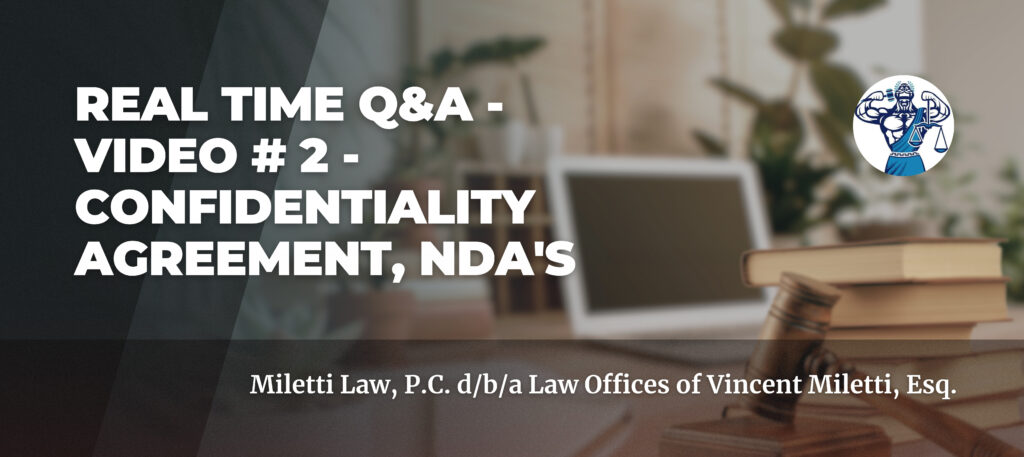Here at the Law Office of Vincent Miletti, Esq. and the home of the #UnusuallyMotivated movement, we take pride as a resilient and dependable legal services firm, providing such services in both a traditional and online, web-based environment. With mastered specialization in areas such as Employment and Labor Law, Intellectual Property (IP) (trademark, copyright, patent), Entertainment Law, and e-Commerce (Supply Chain, Distribution, Fulfillment, Standard Legal & Regulatory), we provide a range of legal services including, but not limited to traditional legal representation (litigation, mediation, arbitration, opinion letters, and advisory), non-litigated business legal representation and legal counsel, and unique, online legal services such as smart forms, mobile training, legal marketing, and development.
Still, here at Miletti Law®, we feel obligated to enlighten, educate, and create awareness, free of charge, about how these issues and many others affect our unusually motivated® readers and/or their businesses. Accordingly, to achieve this goal, we have committed ourselves to create authoritative, trustworthy, & distinctive content. Usually, this content is featured as videos posted on our YouTube Channel https://www.youtube.com/channel/UCtvUryqkkMAJLwrLu2BBt6w and blogs that are published on our website WWW.MILETTILAW.COM. With that, the ball is in your court and you have an effortless obligation to subscribe to the channel and sign up for the Newsletter on the website, which encompasses the best way to ensure that you stay in the loop and feel the positive impact of the knowledge bombs that we drop here!
As the authoritative force in Employment Law, it only seemed right to introduce one of the many upcoming series in which we introduce a variety of topics that looks to educate and deliver in a manner that only Miletti Law® can. In this regard, this is Part XXIII and the last blog of our series on “Trade Secret Misappropriation & Restrictive Covenant Claims.” In Part XXII, we shifted gears and hammered on “Strategies for Countering Potential Counterclaims or Defenses.”Regarding this, we mentioned that the most expectable counterclaims and defenses include (1) competitors could easily access the employer’s allegedly confidential information, (2) the company breached its contractual obligations to the employee, and (3) the covenants at issue are unenforceable and overbroad. Accordingly, we mentioned that employers should be aware of the laws and regulations applicable within the jurisdictions in which they operate or wish to make preliminary injunction or temporary restraining order applications and, accordingly, proactively draft enforceable restrictive covenants and agreements.
As we conclude this series, we have provided you with key information concerning “When to Seek Non-injunctive Relief and Other Available Remedies” in this blog and Part XXIII of the series.
When to Seek Non-injunctive Relief and Other Available Remedies
Relief sought following an application for a preliminary injunction or temporary restraining order may not always be injunctive. This is because, in addition to injunctive relief, an employer may wish to seek money damages (e.g., lost profits) or other types of non-injunctive relief (attorney’s fees) and liquidated damages (a set amount of damages that parties usually agree to in advance) when an employee and/or new employer breaches a post-employment restriction. However, the agreement must contain a provision that other non-injunctive relief may be obtained.
However, when making an application for preliminary injunction or temporary restraining order, it is critical to consider whether the defendant (former employee and/or new employer) would assert that by claiming non-injunctive relief (such as money damages), the plaintiff (employer) is admitting that it does not face irreparable harm, which is a fundamental prerequisite for obtaining injunctive relief.
It is also critical to note that in some jurisdictions, an articulately-prepared restrictive covenant agreement through which an employee acknowledges the awarding of attorney’s fees, liquidated damages, or monetary damages in addition to, and not in lieu of, injunctive relief, may be used, without limiting the availability of injunctive relief, to provide capacity for other alternative forms of relief.
Importantly, in order for a plaintiff to be entitled to liquidated damages under give post-employment restriction breaches, the covenant should have typical characteristics that include, but are not limited to (1) the liquidated damages represent a fair amount that does not constitute a penalty, (2) the parties must intend to set damages in advance, (3) calculating the actual damages must be difficult, and (4) it has to provide the formula for the applicable liquidated damages. Importantly, the law stipulates that an amount that is grossly disproportionate to the probable loss cannot be constituted as part of the liquidated damages.
With that, we have concluded our series on “Trade Secret Misappropriation & Restrictive Covenant Claims,” in which we have provided you with crucial information on issues and laws related to making trade secret misappropriation and restrictive covenant claims, as well as seeking injunctive relief for the same. As usual, since we have more upcoming series after this, stay tuned for more legal guidance, training, and education. In the interim, if there are any questions or comments, please let us know at the Contact Us page!
Always rising above the bar,
Isaac T.,
Legal Writer & Author.
 Professional Legal & Business Services And Representation - English & Espanol!
Professional Legal & Business Services And Representation - English & Espanol!

 314-648-2586
314-648-2586 CALL US NOW
CALL US NOW








